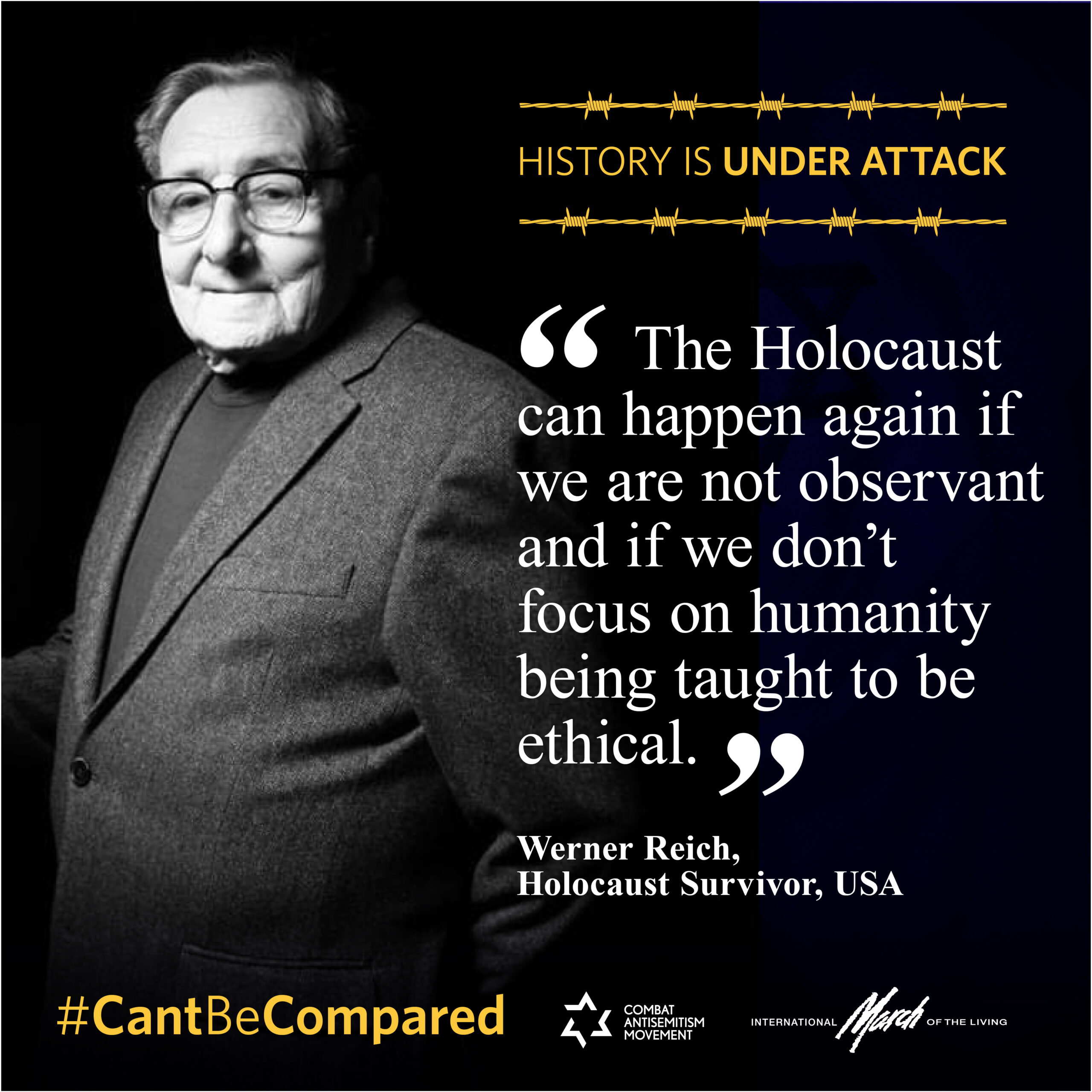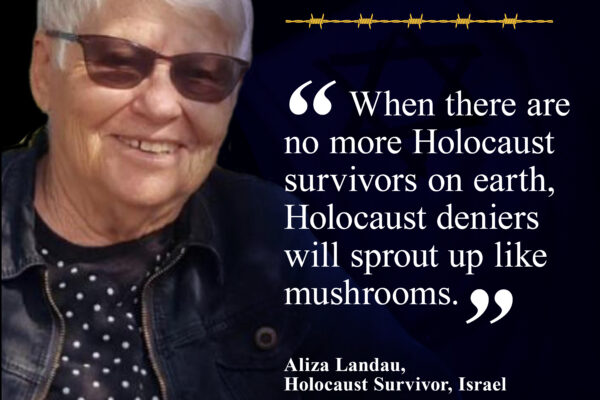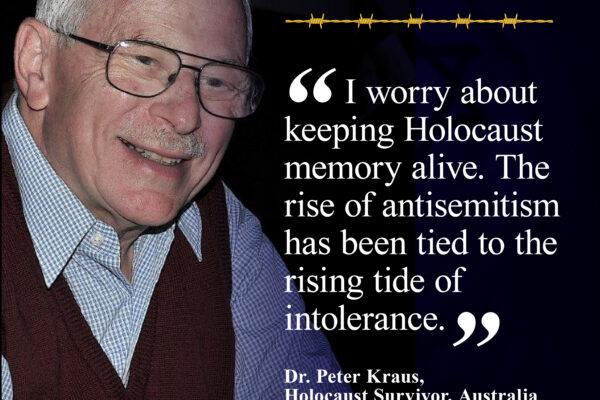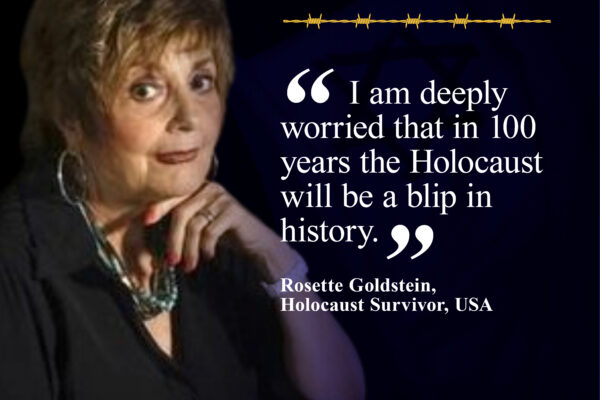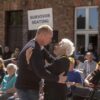Werner is a docent at the Holocaust Memorial and Tolerance Center of Nassau County
By Monise Neumann, International March of the Living
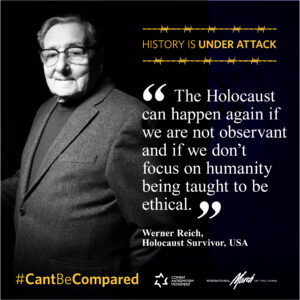 Werner Reich was born in Berlin, Germany, in 1927. In 1933, his father lost his job as an engineer due to anti-Jewish laws. The family emigrated to Zagreb, Yugoslavia, where he attended local schools. Werner’s mother was awarded the Iron Cross for her work as a nurse during World War 1. She falsely believed that this would keep her safe when World War 2 broke out.
Werner Reich was born in Berlin, Germany, in 1927. In 1933, his father lost his job as an engineer due to anti-Jewish laws. The family emigrated to Zagreb, Yugoslavia, where he attended local schools. Werner’s mother was awarded the Iron Cross for her work as a nurse during World War 1. She falsely believed that this would keep her safe when World War 2 broke out.
After his father died in 1940 and Germany invaded Yugoslavia in 1941, Werner’s mother placed him in hiding with various families. The last family who hid him were partisans and Werner helped them until spring 1943, when he was arrested by the Gestapo, beaten, and transferred to several prisons, including the police headquarters in Graz, Austria, where he spent six weeks. From Graz, Werner was transferred to Vienna and then to the Theresienstadt prison ghetto in Czechoslovakia.
In the spring of 1944, Werner was transferred to Auschwitz II, Poland, the Birkenau extermination camp. On July 6, Dr. Mengele, by means of three selections, separated 89 young people out of 5,000 inmates and transferred them to a different camp. The remaining prisoners were gassed over the next few days. When the war was over, 46 of the 89 youngsters were still alive, including Werner. From Birkenau, Werner was transferred to Auschwitz I, which was occupied by German criminals serving long prison sentences.
In January 1945, he was given a piece of bread and began a three-day death march and then a four-day train ride. The final part of the journey, in open railroad cars, caused frostbite resulting in loss of toes on his feet. The journey ended at the Mauthausen concentration camp in Austria. Extreme conditions and lack of food caused starvation and even some cannibalism in the camp. On May 5, 1945, the camp was liberated by American forces.
Werner returned to Yugoslavia, under extreme communism, but found no family and few friends. After two years, he fled to England where he worked as a laborer in a machine shop and later as a tool and die maker. In 1955, he married a Czech Kindertransport child and immigrated to the United States. Working daytime and attending college at night, Werner graduated after 10 years and worked as an industrial engineer and executive for major corporations. He has two sons and four grandchildren.
Since his retirement, Werner has authored two books and has been a frequent speaker in colleges and schools, addressing more than 1,500 people each year, stressing the concept that “indifference kills.” Werner has been an invited speaker in several countries overseas and with the Long Island Philharmonic. He is a docent at the Holocaust Memorial and Tolerance Center of Nassau County and, in 2005, was awarded its Speaker of the Year award and the Hadassah Myrtle Wreath Award for Educator of the Year. Werner is a member of the International Brotherhood of Magicians and the Psychic Entertainers Association.
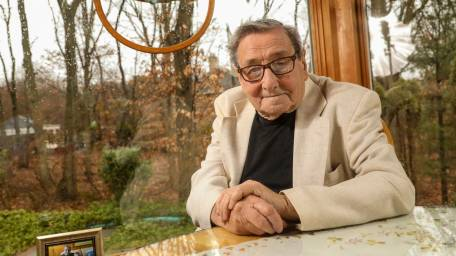
‘We need to focus on why the Holocaust happened and how to prevent it happening again
For Werner, the biggest problem with the continued rise in antisemitism and the comparisons between Fauci, Bourla, and Mengele, is that not enough emphasis is placed on how to prevent these types of atrocities from happening again. Prevention is vital, as is an emphasis on ethical education- learning to be respectful of others. We need to focus on “why” the Holocaust happened and “how to prevent it from happening again,” and not solely on the details of this atrocity. He believes that the Holocaust could happen again if we are not observant and if we don’t focus on humanity being taught to be ethical.
When Werner lectures, and he has done so for roughly 30 years, he always concludes- with the words of Martin Luther King: “In the end, we will remember not the words of our enemies, but the silence of our friends.”
Werner is a huge believer in living a life based on kindness. When he was in Auschwitz- a fellow prisoner, Mr. Levin, who was a professional magician, showed him a card trick and then taught him how to do it. This act of kindness fashioned Werner’s love of magic – helped him get through the horrors.
He informed me that want he went through cannot be described or imagined: Living under the threat of death every day, being hungry and cold, wondering in the morning if he would be alive in the afternoon, and hoping for a miracle. He quotes the words of David Ben Gurion: “A Jew who doesn’t believe in miracles is not a realist.” When Werner thinks back to his experience, he cannot imagine how he survived.
Werner and other Holocaust survivors from around the world are participating in the global #CantBeCompared campaign, speaking ahead of International Holocaust Remembrance Day, January 27, against a backdrop of growing trivialization of the Holocaust, especially in the context of the Covid-19 pandemic, which has seen comparisons made between pandemic restrictions and Nazi measures against Jews during the Holocaust.
